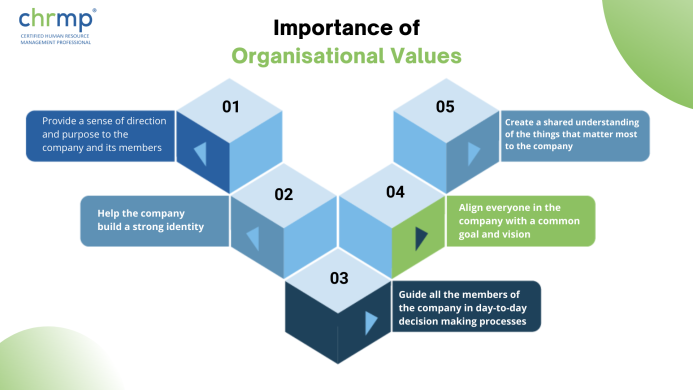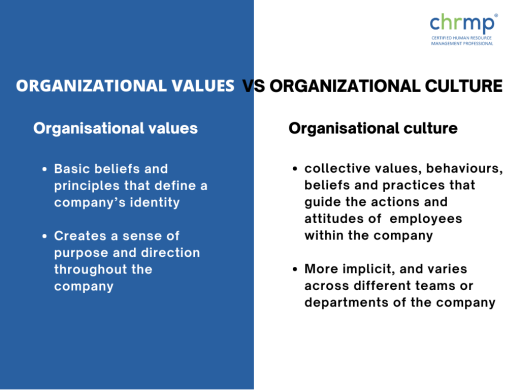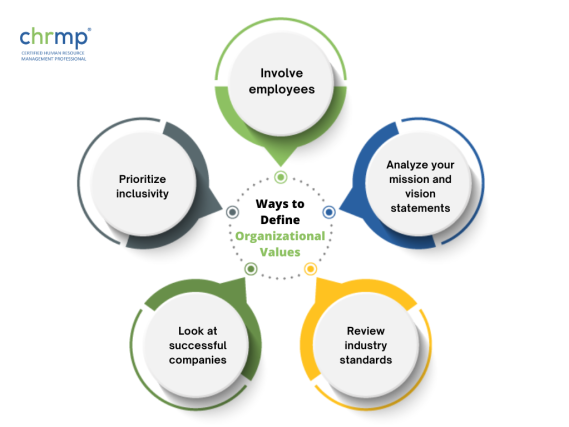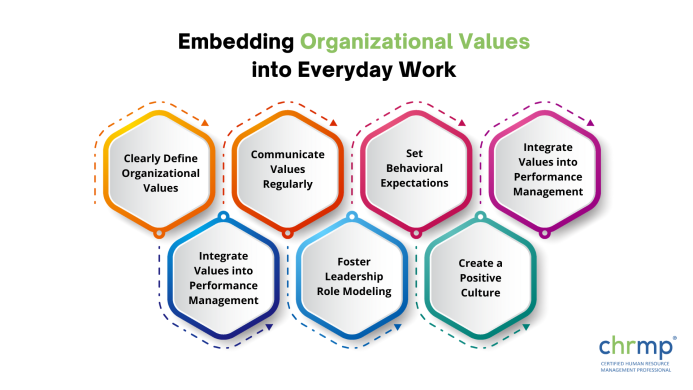

Organisational values are the basic building blocks of the fundamental beliefs and principles a company is built on. They are a considerable influence, guiding the company’s behaviour, culture, and decision-making processes. They also define a company’s identity and lay the foundation for employees, and set the tone for how they interact with each other, customers and stakeholders.
Organisational values are a powerful means to shape the company and its future and are more than mere words on a wall or website. They create a shared sense of purpose and commitment among employees and align the company’s actions with its overall vision, thus building an influential and resilient organisational culture.
In this blog, we shall explore organisational values in-depth and look at their definition, importance, examples, and how you can define your own company’s values that help you accelerate on the path to success. So, let’s dive in and explore the world of organisational values!
Let’s get started with the most basic question:
Organisational values are the fundamental beliefs and principles on which an organisation functions and guide the day-to-day decisions and behaviour. They define the company’s core identity and help it create a sense of direction and purpose.
They are defined by the company’s senior leaders or its founders and are then communicated throughout the company to employees, stakeholders and customers. They are a standard framework on which the company is shaped and help create a shared understanding of what is most important to the company.
Some common examples of organisational values include integrity, teamwork, respect, customer service, diversity, inclusion and social responsibility.
These values are not just words on a page; they are intended to guide the behaviour and decision-making of employees at all levels of the organisation.
Organisational values align the company around common beliefs and principles, leading to a more positive and productive workforce, increased employee engagement and improved business outcomes.
Organisational values are important as they provide a sense of direction and purpose to the company and its members. They help the company build a strong identity and create a shared understanding of the things that matter most to the company.

Organisational values align everyone in the company with a common goal and vision, thus creating a sense of unity and creation of a better work environment which fosters employee engagement and enhances outcomes for the company.
Organisational values guide all the company members in day-to-day decision-making processes at all levels of the company and shape its culture.
Ultimately, organisational values are critical for building a strong, resilient organisation that adapts and thrives in a rapidly changing business environment.
The terms’ organisational values’ and ‘organisational culture’ are often used interchangeably. However, these two terms have significant differences.
The terms’ organisational values’ and ‘organisational culture’ are often used interchangeably. However, these two terms have significant differences.
On the other hand, organisational culture refers to the collective values, behaviours, beliefs and practices that guide the actions and attitudes of employees within the company.

Culture can be regarded as the ‘personality’ of a company and is influenced by many factors, including the style of leadership, patterns of communication, and the norms of the workplace.
Organisational culture is a more complex and dynamic concept that is shaped by an array of internal and external factors and is often more challenging to define and measure than organisational values.
Culture is more implicit and varies across different teams or departments of the company. On the other hand, organisational values provide a foundation on which the organisation’s culture is built.
To summarise, organisational culture and organisational values are related but two distinct concepts. The values of an organisation lay the foundation on which corporate culture is shaped.
Culture is a more complex and dynamic concept and is much harder to define than organisational values
Here are some values that companies commonly adopt:
1. Integrity: This value emphasises honesty, transparency, and ethical behaviour. Organisations that prioritise integrity aim to build trust and credibility with their customers, employees, and other stakeholders.
2.Innovation: This value focuses on creativity, experimentation, and continuous improvement. Organisations prioritising innovation aim to stay ahead of the competition by developing new products, services, and processes.
3.Teamwork:This value emphasises collaboration, communication, and mutual support. Organisations prioritising teamwork aim to build strong relationships among employees and encourage them to work together to achieve common goals.
4.Customer Service: This value focuses on delivering high-quality products and services that meet the needs and expectations of customers. Organisations prioritising customer service aim to build strong customer relationships and create a positive reputation in the marketplace.
5.Social Responsibility: This value emphasises the importance of giving back to the community and positively impacting society. Organisations that prioritise social responsibility may support charitable causes, engage in sustainable business practices, or promote diversity and inclusion in the workplace.
Defining the values of an organisation is an important step in shaping your organisation’s culture and building a strong and productive workforce.
Here are some ways to define your company’s organizational values:

One effective way to define the values of an organisation is to involve employees in the process.
Conduct surveys or focus groups to gather input on what values employees believe are most important to the organisation.
Your mission and vision statements can provide a starting point for defining the values of your organisation.
Look for key themes and values that are reflected in these statements and consider how they can be translated into specific organisational values.
Consider industry standards and best practices when defining your company’s values.
What values are most important in your industry, and how can they be reflected in your organisation?
Take inspiration from successful companies and their values.
What values have helped these companies achieve success, and how can they be adapted to your organisation?
When defining the values of an organisation, prioritise inclusivity and diversity.
Ensure that your values reflect a commitment to creating a positive and respectful work environment for all employees.
Ultimately, the process of defining the values of an organisation should be collaborative, inclusive, and reflective of your organisation’s unique identity and culture. By defining your values, you can build a strong and resilient organisation that can adapt and thrive in a rapidly changing business environment.
It is important to consistently reinforce the values in all aspects of the organisation and ensure that employees understand how to apply them in their day-to-day work.
When values are genuinely integrated into the fabric of an organisation, they can serve as a guiding compass for employees, shaping their behaviours and decisions and fostering a positive and values-driven work environment.
Embedding organisational values in everyday work requires intentional efforts and consistent actions.
Here are some practical steps that can be taken:

1.Clearly Define Organizational Values:
Begin by defining organisational values in a clear and concise manner. Ensure that these values align with the organisation’s mission, vision, and overall purpose. It’s important to articulate the values in a way that is easy to understand and remember for all employees.
2.Communicate Values Regularly:
Values should be communicated regularly and consistently throughout the organisation. Use multiple channels, such as team meetings, email updates, and internal newsletters, to reinforce the values and their importance in the workplace. Ensure that leaders consistently and authentically communicate the values in their messages and actions.
3.Set Behavioral Expectations:
Clearly outline the expected behaviours that reflect the organisational values. Provide specific examples of how employees can demonstrate these behaviours in their day-to-day work. This could include respecting diversity, demonstrating integrity, promoting collaboration, and being customer-centric. Be explicit about the behaviours that are aligned with the values and those that are not.
4.Integrate Values into Performance Management:
Incorporate the values into the performance management process, including goal-setting, performance reviews, and feedback. Tie performance evaluations to the extent to which employees demonstrate the values in their work. Recognise and reward employees who consistently exhibit behaviours that align with the values and address any performance gaps related to matters constructively and developmentally.
5.Provide Training and Development:
Offer regular training and development programs that focus on building the skills and competencies required to live out the organisational values. Provide resources, workshops, and learning opportunities that help employees understand the importance of and how to apply them in their specific roles. Offer reinforcement training and refreshers to sustain awareness and understanding of the values over time.
6.Foster Leadership Role Modeling:
Leaders play a critical role in embedding organisational values into everyday work. Leaders should consistently model the desired behaviours and hold themselves accountable to the values. They should demonstrate how the values guide their decision-making, communication, and actions. Leaders should also provide feedback and recognition to employees who demonstrate values-aligned behaviours and hold employees accountable when they fall short.
7.Create a Positive Culture:
Foster a positive work culture that is built on the foundation of the organizational values. Encourage open communication, collaboration, and mutual respect among employees. Celebrate successes and acknowledge employees who exemplify the values in their work. Foster a culture that encourages employees to raise questions, seek feedback, and share ideas that align with the values.
8.Regularly Evaluate and Adjust:
Regularly evaluate the effectiveness of embedding values into everyday work and adjust as needed. Solicit feedback from employees, monitor progress, and identify areas of improvement. Continuously assess whether the values are integrated into the organisation’s processes, policies, and practices, and make necessary changes to align with the desired culture.
In conclusion, embedding organisational values in everyday work requires a multi-faceted approach that involves clear communication, behavioural expectations, leadership role modelling, performance management, training and development, fostering a positive culture, and ongoing evaluation and adjustment.
1. What are organisational values?
Organisational values are the core beliefs and principles that guide the behaviour and decision-making of an organisation. They define the organisation’s identity and help to create a sense of purpose and direction.
2. Why are organisational values important?
Organisational values are important because they provide a sense of direction and purpose. They define the organisation’s identity and help create a shared understanding of what is essential. When everyone in the organisation is aligned around a common set of values, it can lead to a more positive and productive work environment, improved employee engagement, and better business outcomes.
3. How can an organisation’s values be defined?
Organisations can define their values through a collaborative process that involves employees, analysing mission and vision statements, reviewing industry standards, looking at successful companies, and prioritising inclusivity.
4. Can organisational values change over time?
Yes, the values of an organisation can change over time as the organisation evolves and adapts to changing business environments, customer needs, and other internal and external factors.
5. How can organisational values be communicated to employees?
The values of an organisation can be communicated to employees through a range of channels, including mission and vision statements, employee handbooks, training programs, and ongoing communication from leadership.
6. How can organisational values be measured?
The values of an organisation can be measured through employee surveys, performance metrics, and other feedback mechanisms that help to assess whether employees are aligned with the organisation’s values and how well the organisation is living up to its stated values.
In conclusion, organisational values are critical to creating a solid and productive workplace culture.
By defining and communicating a set of core beliefs and principles that guide the behaviour and decision-making of the organisation, leaders can create a sense of purpose and direction that can drive positive business outcomes and employee engagement.
While defining organisational values can be challenging and complex, creating a more cohesive and productive work environment is worth the effort.
By involving employees, prioritising inclusivity, and continuously measuring and refining the organisation’s values, leaders can create a culture that is resilient, adaptable, and aligned around a shared set of beliefs and principles.
© 2007-2025 CHRMP| All Rights Reserved | Powered by Ripples Learning & Research Private Limited

Fill in the below details to get a HRBP Advanced Program Plan.
